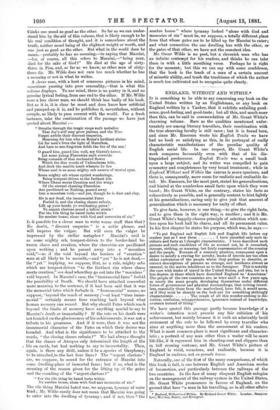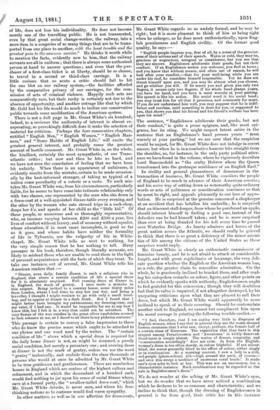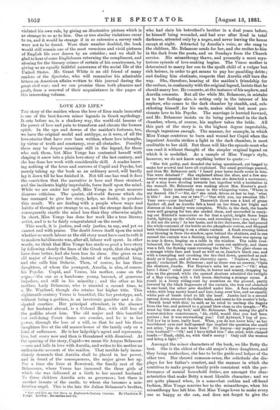ENGLAND, WITHOUT AND WITHIN.*
IT is something to be able to say concerning any book on the United States written by an Englishman, or any book on
England written by a Yankee, that it exhibits unfailing good- sense, good-feeling, and good-taste ; but all this, and much more than this, can be said in commendation of Mr. Grant White's charming volume. Rare as the qualities mentioned unfor-
tunately are among literary travellers, their combination with the true observing faculty is still rarer ; but it is found here, and since Mr. Emerson wrote his English Traits we have
had no book so satisfying as this, in its portrayal of really characteristic manifestations of the peculiar quality of English social life. In one respect, Mr. Grant White's work compares favourably even with that of his dis- tinguished predecessor. English Traits was a small book upon a large subject, and its writer was compelled to gain symmetry and completeness by very broad treatment ; while in
England Without and Within the canvas is more spacious, and there is, consequently, more room for realistic and realisable de-
tail. Mr. Emerson, for the most part, stated his generalisations, and hinted at the numberless small facts upon which they were based ; Mr. Grant White, on the contrary, states his facts as exhaustively as possible, and is generally content to hint lightly at his generalisations, caring only to give just that amount of generalisation which is necessary for unity of effect.
To give facts, however, is one thing,—to give the right facts,
and to give them in the right way, is another ; and it is Mr. Grant White's happily-chosen principle of selection which con- fers upon his book half its charm, and all its permanent value.
In his first chapter he states his purpose, which was, he says :—
"To put England and English folk and English life before my readers just as I saw them I have recorded only such in- cidents and facts as I thought characteristic. I have described such persons and such conditions of life as seemed not, be it remarked, strange, striking, or amusing, but fairly representative of the country and the people. Because of a contrary practice, consequent upon a desire to satisfy a craving for novelty, books of travels are too often either caricatures of the people whom they profess to describe, or correct descriptions of persons as strange, and incidents almost as unusual, to the native inhabitant as to the foreigner. This is notably the case with books of travel in the United States, and also, but in a less degree, in those which have described England to Americans.' The people of the two countries are, or were until a few years ago, so nearly the same people, developing themselves under different forms of government and physical surroundings, that writing travel- lers, especially those from the motherland, have felt, it would seem, as if they must be sharply on the look-out for something strikingly characteristic The result of all this wonder-seeking is dis- tortion, confusion, misapprehension, ignorance instead of knowledge, aversion instead of liking."
We have quoted this passage partly because knowledge of a writer's intention must precede any fair criticism of his achievement, but mainly because it is such an admirably lucid statement of the rule to be followed by every traveller who aims at anything more than the amusement of his readers. What is most common-place is most significant and character- istic; a portrait of any man other than a waiter will be more life-like, if it represent him in shooting-coat and slippers than in full evening costume, and Mr. Grant White's picture of
England is vivid, veracious, and realisable, because it is England in undress, not en grande Jenne.
Naturally, one of the first of the many comparisons, of which this book is full, is one between English and American modes of locomotion, and particularly between the railways of the two countries. In the face of many eloquent English eulogies on the management of the railway system in the United States, Mr. Grant White pronounces in favour of England, on the ground that here "a man in his travelling, as in all other affairs
• England, Without and Within. By Richard Grant White. London: Sampson Low, Marston, Searle, and Rivington.
of life, does not lose his individuality. He does not become merely one of the travelling public. He is not transmuted,
even by that great social change-worker, the railway, into a mere item in a congeries of so many things that are to be trans-
ported from one place to another, with the least trouble and the greatest gain to the common carrier." He thinks it worth while to mention the facts, evidently new to him, that the railway servants are all in uniform ; that there is always some authorised person at hand to answer questions ; and even that the pur- chaser of a first-class ticket is at liberty, should he so choose, to travel in a second or third-class carriage. It is a little curious, that so acute a critic should fail to hit the one blot on our railway system,—the facilities afforded by the comparative privacy of our carriages, for the com- mission of acts of criminal violence. Happily such acts are comparatively rare, but their rarity is certainly not due to the absence of opportunity, and another outrage like that by which Mr. Gold lost his life would do much to incline our conservative public towards some modification of the American system. There is not a dull page in Mr. Grant White's six hundred; indeed, to a reviewer the uniformity of interest is almost ex- asperating, so provokingly difficult does it make the selection of material for criticism. Perhaps the four consecutive chapters, entitled "English Men," "English Women," "English Man- ners," and "Some Habits of English Life," will excite the greatest general interest, and probably rouse the greatest amount of hostile comment. Mr. Grant White is, on the whole, the kindliest, certainly the most sympathetic, of our Trans- atlantic critics ; but now and then he hits us hard, and we have not even the consolation of feeling that we have been hit unfairly. When there is an appearance of unfairness, it evidently results from the mistake, certain to be made occasion- ally by the best-informed stranger, of taking as typical of a nation some peculiarity of a coterie or a caste. To such mis- takes Mr. Grant White was, from his circumstances, particularly liable, for he seems to have come into intimate relationship only with two classes, one represented by the man who sits down in a dress-coat at a well-appointed dinner-table every evening, and the other by the woman who eats stewed tripe in a cook-shop, drops her les, and speaks of her child as the "little kid." Of these people, so numerous and so thoroughly representative, who, on incomes varying between 2200 and 2500 a year, live lives of comfort without luxury, and of economy without squalor, whose education, if in most cases incomplete, is good so far as it goes, and whose habits have neither the formality of life in Tyburnia, nor the vulgarity of life in White- chapel, Mr. Grant White tells us next to nothing, for the very simple reason that he has nothing to tell. Many passages in his book, therefore, though literally accurate, are likely to mislead those who are unable to read them in the light of personal acquaintance with the facts of which they treat. To take one instance, out of several, Mr. Grant White tells his American readers that :—
"Dinner, even daily, family sinner, is such a religious rite in England, that above a certain condition of life a special dress for it is absolutely required. Full evening dress at dinner is, in England, the mark of gentry. I once made a mistake in this respect. Being invited to a country house, some thirty miles from London, where I had time to stay but one day, and being a traveller, I thought I might venture to go with only a small hand- bag, and to appear at dinner in a dark frock. But I found that I might better have brought my portmanteau, my dressing-case, and my valet, if I had one. It would be impossible for me to say how I knew this, but I felt it in a way that could not be mistaken. The very flames of the wax candles in the great silver candelabra seemed to look askance at me, as I dared to sit there in my plebeian costume."
• This passage is certain to convey a false impression to those who do know the precise sense which ought to be attached to one phrase and one word used by the writer. The "certain condition of life" above which a special dress is required for the daily home dinner is not, as might be assumed, a purely social condition, but merely a pecuniary one ; and evening dress at dinner is not the mark of gentry, unless we use the word "gentry" technically, and exclude from the class thousands of persons who would at once be admitted by Mr. Grant White to be true gentlemen and gentlewomen. There are numberless homes in England which are centres of the highest culture and refinement, and in which the descendant of a hundred earls would find nothing to jar upon his sense of social fitness where, save at a formal party, the "swallow-tailed dress-coat," which Mr. Grant White detests, is never seen, and where his free- thinking notions as to costume would find warm sympathy.
In other matters, as well as in our affection for dress-coats, Mr. Grant White regards us as unduly formal, and he may be right ; but it is more pleasant to think of him as being right when he enlarges, as he does most enthusiastically, upon Eng- lish genuineness and English civility. Of the former good quality, he says :—
" English people impress you, first of all, by a sense of the genuine- ness of their actions and of their speech. Warm or cold, they may be, gracious or ungracious, arrogant or considerate, but you see that they are sincere. Englishmen adulterate their goods, but not their conduct. If an Englishman makes you welcome, you feel at home ; and you know that without reason, and often out of reason, he will look after year comfort,—that for your well-being while you are under his roof, he considers himself responsible. Yet he does not thrust himself upon you, and you may do almost what you choose, and go whither you will. If he meets you and gives you only two fingers, it means only two fingers; if his whole hand grasps years, you have his hand, and you have it most warmly at your parting. His speech is like his action. His social word is his social bond ; you may trust him for all that it promises, and commonly for more. If you do not understand him well, you may suppose that he is indif- ferent and careless, until something is done for you, or suggested to you, that shows you that his friend and his friend's welfare has been upon his mind."
The sentence, "Englishmen adulterate their goods, but not their conduct," is quite a prose epigram, and, like most epi- grams, has its sting. We might suspect latent satire in the sentence that an Englishman's hand presses yours "most warmly at your parting," but we are sure that the suspicion would be unjust, for Mr. Grant White does not indulge in covert sneers; but when he is in a combative humour hits straight from the shoulder, as, for instance, in the only party political utter- ance we have found in the volume, where he vigorously describes Lord Beaconsfield as "the crafty Hebrew whom the Queen transformed into the grotesque semblance of an English Earl."
In civility and general pleasantness of demeanour in the transaction of business, Mr. Grant White considers the people of England to be much in advance of their American cousins ; and his naïve way of setting down as noteworthy quite ordinary words or acts of politeness or consideration convinces us that he must be right, and appeals pleasantly to our love of appro- bation. He is surprised at the genuine concern of a shopkeeper
at an accident that has befallen his umbrella ; he is surprised that an itinerant stall-keeper, from whom he purchased an apple, should interest himself in finding a good one, instead of the defective one he had himself taken ; and he is more surprised than ever at being thanked for his toll every time be passed
over Waterloo Bridge. As hearty admirers and lovers of the great nation across the Atlantic, we should really be grieved to think that there is so great a deficiency of the minor ameni- ties of life among the citizens of the 'United States as these surprises would imply.
Mr. Grant White is clearly an enthusiastic connoisseur of feminine beauty, and he is not afraid to attack at considerable length, and with great explicitness of language, the very deli- cate question whether the English or the American woman has, as a rule, the greater claim to masculine admiration. On the whole, be is graciously inclined to bracket them, and after read- ing his outspoken remarks on colour, figure, and other points on which he evidently speaks with authority, Englishwomen ought to feel grateful for this concession ; though they will doubtless feel that its value is impaired, if not altogether destroyed, by his unsparing criticisms upon what they are pleased to call their dress, but which Mr. Grant White would apparently be more inclined to speak of as their covering. Should he contemplate another visit to England, we cannot but compliment him upon his moral courage in printing the following terrible verdict:—
" I feel, therefore, that I am saying very little in dispraise of English women, when I say that in general they are the worst-dressed human creatures that I ever saw, except, perhaps, the female half of a certain class of Germans. The reputation that they have in this respect among Frenchwomen and 'Americans' is richly deserved. Good-taste is simply absent. The notion of fitness, congruity, and concatenation accordingly' does not exist. In form the English- woman's dress is too often dowdy, in colour frightful. If not colour- blind, she seems generally blind to the effect of colour, either singly or in combination. At a morning concert, I saw a lady in a rich, red-purple (plum-colour) silk—high around the neck, of course— and over this swept a necklace of enormous coral beads ! It made one's eyes ache to look at her. This was not an uncommon, but a characteristic instance. Such combinations may be regarded as the rule in Englishwomen's dress."
We do not wonder at the aching of Mr. Grant White's eyes, but we do wonder that we have never noticed a combination which he declares to be so common and characteristic; and we incline to think that, though the dressing of Englishwomen in general is far from good, their critic has in this instance violated his own rule, by giving an illustrative picture which is as strange to us as to him. One or two similar violations occur to us, and it would be strange if in so extensive a survey such were not to be found. Were their number doubled, the book would still remain one of the most veracious and vivid pictures of English life ever drawn by an outsider ; and we shall be glad to hear of some Englishman returning the compliment, and atoning for the literary crimes of certain of his countrymen, by giving us an equally faithful panorama of the social life of the United States. Mr. Grant White is an old friend of many readers of the Spectator, who will remember his admirable letters on American affairs written to this journal daring the great civil war ; and we can promise them both pleasure and profit, from a renewal of their acquaintance in the pages of this interesting volume.
































 Previous page
Previous page